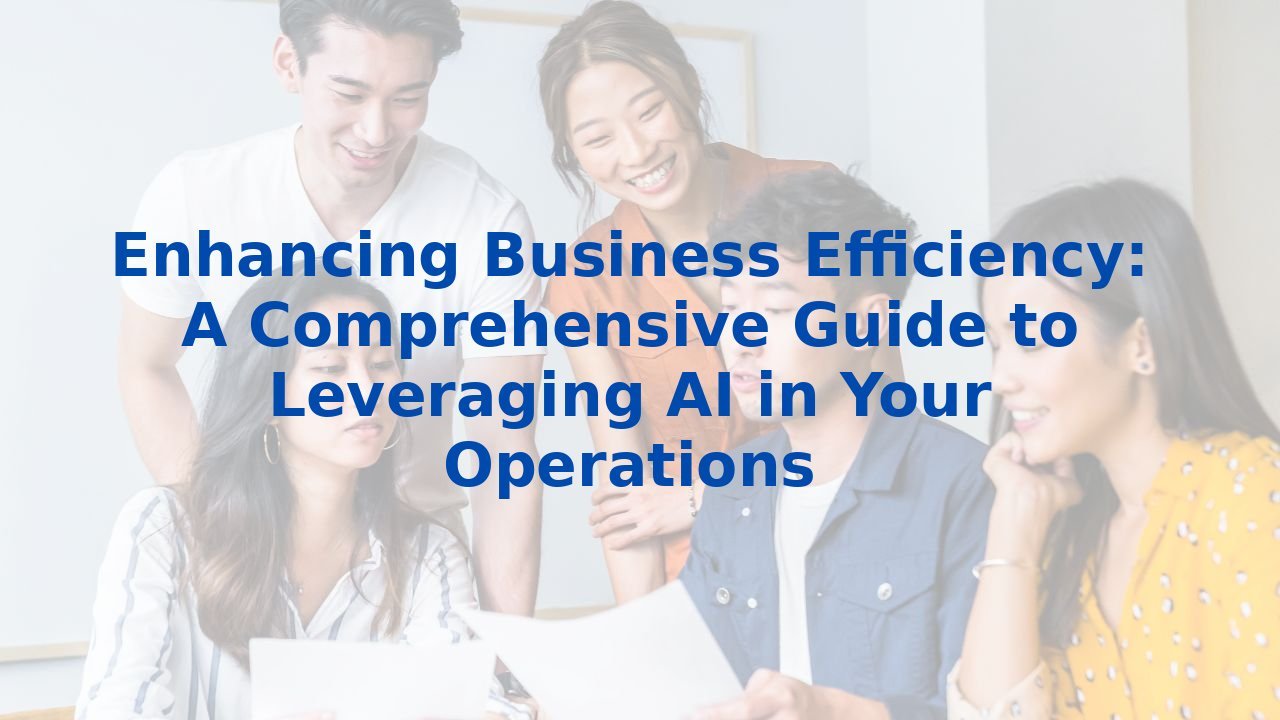Enhancing Business Efficiency: A Comprehensive Guide to Leveraging AI in Your Operations
Enhancing Business Efficiency with AI: A Comprehensive Guide
In an ever-evolving business landscape, the integration of Artificial Intelligence (AI) into operational processes has transcended from a mere trend to a cornerstone of efficiency and competitiveness. This comprehensive guide explores how AI can not only optimize business operations but also empower organizations to make smarter decisions, enhance productivity, and ultimately, thrive in their respective markets.
1. Automating Routine Tasks
Imagine your team freed from the tedium of repetitive tasks. This is one of the most profound gifts AI brings to the table. By employing technologies such as Robotic Process Automation (RPA) and Intelligent Document Processing (IDP), businesses can dramatically reduce manual labor and human error. For instance, AI algorithms can swiftly process and extract crucial data from large volumes of documents, transferring it to software systems seamlessly. This automation allows employees to focus on critical, strategy-driven tasks that require human insight.
2. Improving Decision Making
Decision-making can be daunting, especially when navigating complex datasets. Enter AI. It enhances decision-making by delivering predictive insights drawn from historical data and immediate analytics. Machine learning algorithms sift through exhaustive data to highlight patterns and simulate various scenarios, arming analysts with the information to make informed choices. Imagine predicting how price adjustments affect profitability or spotting potential risks in lending scenarios. AI transforms uncertainty into clarity.
3. Enhancing Customer Service
The symbiosis of AI and customer service is reshaping how businesses interact with clients. Automated systems like chatbots adeptly handle standard inquiries, freeing up human agents for more nuanced discussions. AI not only automates responses but can also analyze interactions to glean insights for service improvement. This proactive approach means businesses can continuously adjust their strategies based on direct customer feedback, fostering a cycle of growth and customer satisfaction.
4. Optimizing Supply Chains
Supply chain management has never been more dynamic, thanks to AI's analytical prowess. Real-time analysis of purchasing data enables businesses to spot anomalies and preemptively address potential disruptions. Furthermore, RPA can streamline the ordering process, thereby reducing lead times. When AI integrates with supplier systems, it dramatically enhances the speed and efficiency of order management, allowing for proactive inventory management and timely replenishments.
5. Supporting Business Process Management
AI's role in Business Process Management (BPM) cannot be understated. Continuous improvement hinges on feedback and data-driven insights, something AI excels at providing. Through process mining, AI analyzes data across systems, pinpointing inefficiencies and identifying bottlenecks. This capability ensures real-time monitoring, empowering companies to make timely adjustments and optimize workflows, ultimately leading to enhanced operational effectiveness.
6. Benefits of AI Training for Employees
Maximizing the potential of AI isn’t just about implementing advanced technologies; it’s equally about empowering the human element of your organization. Training employees to work effectively with AI is essential. Tailored training programs equip your workforce with crucial skills in data analysis, pattern recognition, and strategic decision-making. When employees are well-versed in AI applications, they leverage these technologies to drive innovation, enhance efficiency, and maximize value—turning potential into reality.
Conclusion
The integration of AI into business processes is more than a value-add; it’s a transformative strategy that elevates overall efficiency. From automating mundane tasks and bolstering decision-making accuracy to optimizing customer service and streamlining supply chains, the advantages are considerable. As organizations continue to adapt and evolve, equipping employees with AI training becomes paramount to fully harness the benefits of this technology. In an increasingly competitive market, leveraging AI isn’t just an opportunity—it’s a necessity that can define success.
The journey towards enhanced business efficiency with AI is not just about technology; it’s about a mindset shift that embraces innovation, empowers people, and prioritizes strategic progress.



